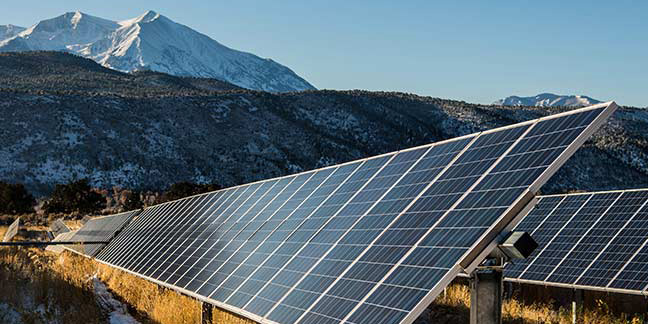
Colorado is setting a remarkable precedent in sustainable energy and eco-conscious practices. From ambitious wind and solar projects to trailblazing eco-friendly sports operations, the state is on the forefront of green initiatives. Colorado’s dedication to environmental stewardship extends across multiple sectors, including the sports industry, as teams and facilities join efforts to reduce their carbon footprints.
Colorado’s Wind Power Projects: Harnessing Renewable Energy
Colorado has firmly established itself as a leader in wind energy, significantly contributing to the national renewable power grid. Through robust state-supported initiatives, Colorado’s wind power projects generate vast amounts of clean energy, supporting both local and interstate power demands.
Colorado ranks in the top five states for wind energy production, boasting over 3,000 wind turbines that generate nearly 20% of the state's electricity. With a goal of achieving 100% renewable electricity by 2040, Colorado’s wind energy sector exemplifies the state’s commitment to sustainable power solutions.
Colorado’s wind farms currently produce over 7,000 megawatts (MW) of electricity, enough to power nearly 2 million homes annually. The state’s infrastructure includes major installations in Kit Carson and Logan Counties, where expansive wind farms contribute significantly to Colorado’s renewable energy targets. By 2030, these facilities aim to increase their output by an additional 2,500 MW.
The wind energy sector in Colorado has generated approximately 7,000 jobs, ranging from turbine manufacturing to maintenance roles. These jobs play a crucial role in local economies, particularly in rural communities. The economic benefits extend beyond employment, as wind power contributes around $90 million in local property taxes annually, directly supporting local schools and infrastructure.
Solar Energy Advancements: Colorado’s Bright Future
Solar energy plays a pivotal role in Colorado’s renewable energy landscape, with ambitious projects underway to boost solar capacity. Currently, solar power accounts for about 8% of Colorado’s electricity production.
As part of its Renewable Portfolio Standard, the state mandates that utilities generate 30% of their power from renewable sources by 2025, with a growing focus on solar. This commitment positions Colorado as a national leader in solar energy, with groundbreaking projects and supportive policies that reinforce the state’s green objectives.
Key projects include the 200 MW Bighorn Solar project, which powers the world’s first solar-powered steel mill in Pueblo. This solar installation, covering 1,800 acres, provides power for both industrial operations and residential needs, solidifying Colorado’s status in sustainable manufacturing.
Colorado’s community solar initiatives enable residents who may not have access to individual solar installations to buy into shared solar farms. These programs enhance accessibility, making clean energy affordable and inclusive for homeowners and renters alike.
Legislative Support for Green Energy
Colorado’s green energy leadership is reinforced by strong legislative backing. Over recent years, the state has passed key policies that mandate renewable energy goals and provide incentives for sustainable development.
Colorado’s legislative framework includes the Clean Energy Plan, which directs utilities to cut greenhouse gas emissions by 80% by 2030. This policy-driven approach ensures accountability and supports both public and private sector investments in renewable energy infrastructure.
Under the Renewable Portfolio Standard, utilities in Colorado must generate at least 30% of their energy from renewable sources by 2025. This requirement has driven substantial investments in wind and solar projects, propelling Colorado toward its green energy goals.
Colorado provides a range of tax incentives for renewable energy projects, including property tax exemptions for solar and wind installations. These incentives reduce the cost of renewable energy production, encouraging more private investment and accelerating the state’s transition to clean energy.
Colorado’s Electric Vehicle Initiatives
Supporting its green energy mission, Colorado has implemented numerous initiatives to increase electric vehicle (EV) adoption statewide. The state offers rebates for EV purchases and funds extensive charging infrastructure to encourage residents to switch to zero-emission vehicles.
With over 2,000 charging stations installed across Colorado, the state ranks as a top leader in EV readiness. By facilitating convenient access to EV charging, Colorado supports a transition from fossil-fuel-dependent vehicles to more sustainable alternatives, significantly lowering statewide emissions.
Colorado provides up to $5,000 in rebates for electric vehicle purchases, one of the highest incentives in the nation. This support makes EVs more accessible to residents, contributing to cleaner air and reduced greenhouse gas emissions.
The state’s charging infrastructure includes both urban and rural locations, ensuring accessibility across all regions. Colorado’s goal is to have 1,000 fast-charging stations by 2030, supporting long-distance travel and daily commutes alike.
Sports Teams’ Green Initiatives: A Commitment to Sustainability
Colorado’s sports teams are increasingly adopting sustainable practices to align with the state’s green energy goals. From energy-efficient stadiums to recycling programs, teams like the Colorado Rockies, Denver Nuggets, and Colorado Avalanche prioritize environmental responsibility.
This dedication not only enhances their community impact but also demonstrates a commitment to fostering sustainability across all sectors. Colorado’s athletic organizations are a testament to how sustainability can be seamlessly integrated into the sports industry, setting an example for other teams nationwide.
The Ball Arena, home to the Denver Nuggets and Colorado Avalanche, uses energy-efficient lighting and recycling systems that minimize waste. The stadium’s solar panels reduce its dependence on grid electricity, reflecting a commitment to clean energy.
Colorado’s sports teams actively promote sustainability to their fans through eco-friendly game-day initiatives, such as encouraging public transportation and providing recycling stations. This outreach increases environmental awareness among the sports community.
Fans play a crucial role in Colorado’s sustainable sports initiatives by supporting eco-friendly practices in stadiums and participating in awareness campaigns. Their engagement reflects a strong community commitment to environmental responsibility.
Fans can support these green initiatives and place bets on their favorite teams using Colorado sportsbooks, which offer a range of environmentally conscious betting options. In these bets, a portion of the stakes goes towards supporting environmental causes.
Stadiums like Empower Field at Mile High offer incentives for fans who use public transportation, reducing the carbon footprint associated with game-day traffic. This initiative underscores the integration of sustainability in the fan experience.
Colorado’s Investment in Clean Energy Jobs
With the rise of sustainable energy, Colorado has also invested heavily in clean energy job creation. These roles span the solar, wind, and EV sectors, supporting a robust green economy that not only benefits the environment but also drives economic growth. Jobs in clean energy attract skilled workers to the state, creating opportunities that align with Colorado’s renewable energy goals.
The employment generated by these initiatives strengthens communities and promotes long-term sustainability in line with the state’s climate ambitions.
Colorado’s renewable energy sector employs over 35,000 individuals, with projections indicating continued growth. The demand for skilled workers in solar installation, EV infrastructure, and wind turbine maintenance remains high.
The state partners with local colleges and technical schools to provide training programs for renewable energy careers. These programs equip Colorado’s workforce with the skills needed to thrive in a green economy.
Eco-Friendly Construction: Green Building Codes and Standards
Green building is a vital aspect of Colorado’s sustainable infrastructure. By enforcing stringent green building codes, the state ensures that new construction aligns with its environmental objectives. Colorado’s building standards encourage energy-efficient designs, sustainable materials, and low-impact construction practices.
Through innovative architectural solutions, Colorado’s green building initiatives significantly reduce the environmental footprint of new developments, contributing to statewide energy savings and reduced carbon emissions.
Colorado mandates energy efficiency standards for new constructions, requiring buildings to meet minimum performance criteria for insulation, lighting, and heating systems. These standards make buildings more energy-efficient and less reliant on fossil fuels.
The use of recycled and locally sourced materials is encouraged in Colorado’s building projects, reducing the environmental impact associated with traditional construction practices. This emphasis on sustainability is evident in both residential and commercial developments.
Collaboration With Renewable Energy Organizations
Colorado collaborates with various renewable energy organizations to enhance its clean energy capabilities. These partnerships include alliances with nonprofits, private companies, and educational institutions to foster innovation and increase the adoption of renewable energy technologies.
By working together, these organizations support Colorado’s ambitious environmental targets, helping the state to develop groundbreaking solutions that benefit the community and the planet alike.
Colorado’s partnerships with research institutions drive advancements in renewable technologies, with an emphasis on solar and wind energy. These collaborations provide valuable insights that guide state policies and improve the efficiency of renewable installations.
The state supports public-private partnerships that fund renewable energy projects. These collaborations offer financial and technical resources, expanding Colorado’s renewable infrastructure and promoting sustainable growth.
Colorado’s strides in renewable energy and sustainable practices highlight a commitment that extends beyond environmental benefits, demonstrating an economic and social responsibility.
Through continued investment, innovative policies, and the active participation of residents and organizations, Colorado remains at the forefront of sustainable power and eco-conscious practices across industries, from energy production to sports. As other states look toward Colorado’s model, the path to a greener future becomes clearer and more attainable nationwide.







